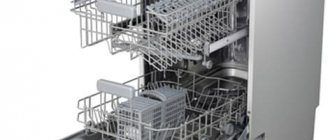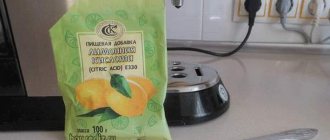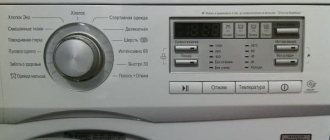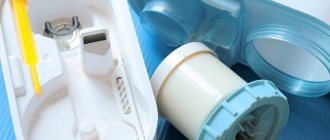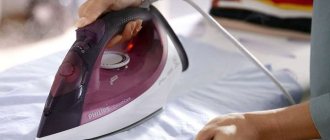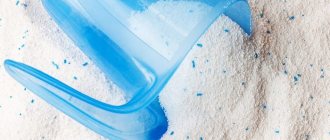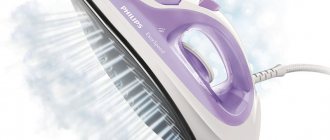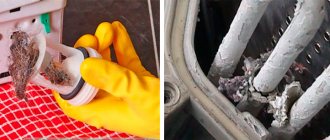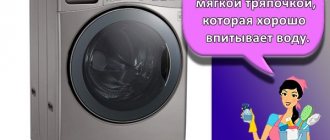- Why do you need to clean your washing machine?
- Is it possible to clean a washing machine with citric acid?
- Why citric acid?
- Cleaning the washing machine with citric acid: recommendations for use
- How to clean a washing machine with citric acid from scale, odor and mold: instructions
- How to clean a drum with citric acid
- User reviews about cleaning the washing machine with citric acid
Why do you need to clean your washing machine?
During long-term operation of the device, dirty deposits accumulate on the surface of plastic and metal parts. This is a favorable environment for the development of bacteria and fungi, which are sources of unpleasant odors.
Experts cite the following as the main causes of unwanted formations on the internal parts of the washing machine:
- hard water from city water supply systems;
- low-quality washing powders, gels, conditioners;
- Frequent operation of the device on intensive washing programs.
Water used for washing often contains large amounts of oxides, calcium and magnesium salts. Under the influence of temperature, they settle in the form of a solid deposit (scale), mainly on the heating element and drum. If you do not take any action, the device will begin to wear out due to accumulated plaque and dirt. This will undoubtedly affect the service life of the unit.
If you take the necessary measures in time, you can avoid repairs and extend the life of your household appliances. Today, there are many effective and budgetary means for these purposes.
Cleaning procedure
In order to understand how to descale a machine, you need to imagine the complex structure of a washing unit in the form of a kettle with a drum. This means that you can clean the washing machine in the same way as a kettle. Only in this case a different proportion of ingredients is used.
Citric acid should be loaded into the washing machine without laundry and detergents. Otherwise, the entire cleaning process will result in your laundry acquiring a lemon scent. You can wash things with this acid, and this will have a positive effect on the condition of the drum and heating element. However, this should only be done in a situation where the water used is highly mineralized. This will allow sediment to form immediately during the washing process. A good rinse after washing helps remove salts rather than allowing them to accumulate inside the machine.
However, if there is a need to remove already accumulated sediment, you need to clean the washing machine at idle speed, that is, without laundry. In this case, nothing will prevent the acid from interacting with salts and accumulated dirt.
To clean, you need to perform the following algorithm:
- instead of washing powder, you need to pour acid in the amount described above;
- then you need to run the machine in the washing mode with hot water (the temperature should be at least 90 degrees);
- the run time should last at least 40 minutes;
- Finally, drain the water and acid and rinse the machine with clean water.
These recommendations are based on average conditions. However, the machine does not tolerate empty washes, so put several rags in the container. A little acid won't do anything to them.
The effectiveness of the action can be assessed by the turbidity of the water, as well as by the condition of the heating element and drum.
If the effect does not satisfy you, then you need to repeat the procedure after the car is completely washed from the previous acid treatment. Surfaces that are not part of the internal mechanisms should also be washed. This is especially true for plastic and rubber parts, which suffer the most from exposure to aggressive environments.
Is it possible to clean a washing machine with citric acid?
Often users of modern household washing equipment ask a similar question. After all, today there is a large selection of special products on store shelves. But if you study their composition, then for the most part the main component is that same citric acid. The only difference is the price and the presence of instructions on the packaging on how to properly clean an automatic washing machine with a citric acid-based product. Therefore the answer is obvious. The concentrate in question is suitable for such events. The main thing is to follow the dosage.
Frequency of care
According to marketers and representatives of other specialties, it is easier to prevent the appearance of limescale than to take measures to eliminate it. It is for this purpose that special products that prevent the appearance of scale are produced and actively advertised.
They are not cheap, and if you look at their composition in detail, there is nothing “innovative” in it. There are also washing powders on sale that already contain “anti-lime additives”. But they are not particularly effective, especially if the water hardness is extremely high. And some women believe that powders with phosphates “wash worse.”
It is impossible to clearly determine the frequency of cleaning a washing machine with citric acid. Because for this it is necessary to take into account several factors at once:
- washing frequency;
- water temperature;
- hardness of water.
The higher the indicators, the shorter the interval. The procedure cannot be carried out more than once a month, even with intensive use of the “machine”. The optimal number of lemon cleanings per year is 5.
To reduce them, it makes sense to take note of these useful tips:
- Set the minimum possible temperature range - 40-500 C, because the less the heating element heats up, the lower the likelihood of scale formation.
- When using washing powder with phosphates, use the amount recommended by the manufacturer.
- Do not machine wash old clothes that should go to the landfill.
- Remove laundry from the drum immediately after spinning.
- Keep the door ajar, and better yet, all the time.
- Install cleaning filters that can reduce water hardness.
- Choose the right washing programs.
Why citric acid?
Due to its properties, this universal substance with a crystalline structure is actively used by consumers for household needs, including for cleaning lime deposits and fungus from the working elements of automatic machines. This popularity is due to the following advantages:
- the food concentrate successfully copes with unpleasant odors, mold and scale deposits on the parts of the device;
- this is a universal and cheap product that is easy to use for cleaning household appliances;
- When used correctly, it does not have a negative effect on humans or the internal parts of the unit.
Judging by the reviews, this method of cleaning a washing machine with citric acid can effectively combat even thick and long-standing limescale deposits.
When and why is cleaning with citric acid necessary?
Some users of a washing machine are convinced that to care for the device, they only need to use it periodically - after all, if you think about it, the walls of the drum regularly come into contact with water and washing powder. Where can pollution come from? However, this is a misconception, and lack of constant care leads to rapid wear and tear of the device.
First of all, regular washing of the washing machine is required in order to prevent the accumulation of scale. It appears due to the fact that tap water contains a large amount of minerals. At the same time, the “weak” point of any washing machine is the heating element (heating element) - as a result of the appearance of plaque on this part, it either completely stops functioning or works intermittently.
Over time, the heater becomes covered with mineral deposits
Due to the accumulation of a dense layer of plaque, more energy is required to heat the water, therefore, the washing machine ceases to be economical. However, even this is not the saddest consequence of the problem: as a result of scale deposits, the heating element completely ceases to perform its functions, so it will have to be replaced. You will have to spend a lot of money to replace this part.
There are other reasons why regular cleaning of a household appliance is required. So, after washing some items with a fleecy structure, lint particles accumulate on the surface of the drum and the heating element. In addition, lint often settles in the hoses of the washing machine, which prevents the liquid from draining (increasing the washing time).
Lint may remain inside the structure after washing.
It is also required because in addition to minerals, the system contains various microorganisms that disappear only during heat treatment. If you regularly wash with cold or warm water, they will accumulate on the surface in large quantities. As a result, mold forms and an unpleasant, musty odor can be felt from the drum, so careful disinfection is required.
Prices for heating elements for a washing machine
Heating element for washing machine
Cleaning the washing machine with citric acid: recommendations for use
Despite the fact that the product in question is an acid, when used correctly it does not harm the internal parts of the automatic machine. In addition, many housewives consider citric acid to be the most effective budgetary remedy in the fight against scale and dirt in an automatic washing machine.
How much citric acid to use when cleaning a washing machine
The correct dosage is the main condition for a successful procedure. The calculation should be 15 g per 1 kg. That is, if the drum is designed for a load of 4 kg, 60 g of food concentrate will be required for cleaning, which is 3-4 tablespoons.
Procedure technology and precautions
Before cleaning the washing machine with citric acid, you must remove all items from the drum. Cleaning occurs without laundry.
The frequency of the procedure depends on the degree of use of the device. If washing with the machine is carried out 4-5 times a week, or the “intensive” mode is often used, it is recommended to clean the machine once a quarter. If less often - once every six months.
Important!
After the cleaning process is completed, be sure to remove and wash the drain filter from any remaining deposits, and the powder compartment from the cleaning agent.
About the advantages and disadvantages
Citric acid as a descaling agent has several advantages:
- availability and reasonable price tag. Crystalline powder is available in almost any store and is suitable even for the most budget-conscious;
- effectiveness. The effect of citric acid used to clean a washing machine is noticeable: unpleasant odors, mold, scale and rust disappear;
- ease of use. No tricky dosage regimens or long and multi-step processes are required to achieve results. Everything is extremely simple.
Citric acid can corrode rubber in the washing machine. This can be considered a disadvantage, if you do not take into account some points:
- rubber seals (door gasket) often suffer from fungus, which also has destructive properties;
- correct dosage and not too frequent use (mandatory rinsing after the procedure) avoid problems with rubber;
- Rubber seals can be removed before cleaning or replaced with new ones if damaged.
Another relative disadvantage is the specific acidic smell from the drum and washed items. A couple of wash cycles and the smell disappears, but not everyone likes it. Although the unobtrusive lemon aroma is far from the most unpleasant thing that a washing machine drum can smell of!
How to clean a washing machine with citric acid from scale, odor and mold: instructions
To get rid of known plaque, unpleasant odors and mold, it is recommended to proceed as follows:
- Pour the prepared product into the powder dispenser (main wash compartment).
- Select a program that allows washing at maximum temperature.
- Then activate the extra rinse mode.
- At the end of the procedure, the plastic powder dispenser should be rinsed under running water (if it is removable) or wiped with a damp and then dry cloth.
- It is also recommended to wipe the drum dry with a soft cloth and check the cuff of the machine for scale and cleaning agent residues.
After the process of cleaning the washer with citric acid is completed, the device can be immediately used for its intended purpose.
Causes and consequences of scale formation
In most cases, scale forms in the form of specific solid formations. They occur at a high temperature of the heating element, when water actively evaporates and all elements are deposited on the walls of the washing machine. During this process, calcium and magnesium salts contained in the water crystallize and give it a certain hardness.
How to clean a washing machine from scale, mold, dirt, odors...
At the same time, pieces of rust, dirt particles, and detergent residues take part in the formation of scale. Gradually, the heating element is completely covered with plaque and its operating efficiency noticeably decreases.
Consequences of scale:
- The tubular electric heater - heating element - fails, often right during washing. The machine automatically turns off and the process is interrupted.
- Reduced thermal conductivity. Leads to additional energy costs and increases washing time.
- Metal parts are subject to active corrosion.
- When the amount of scale reaches a critical level, the unit fails within a short time and requires repair. In many cases, a part affected by plaque cannot be cleaned and requires replacement.
- Simultaneously with the plaque, the appearance of fungus, odor and dirt is observed, requiring complex and costly measures to destroy them.
How to clean a drum with citric acid
To descale the tank and drum, follow these instructions:
- The cleaning agent concentrate is placed directly into the drum. For one procedure, 100 g is enough.
- The device is set to perform a washing mode that provides a temperature of at least 60°C.
- 10-15 minutes after the start of the program (when the heating element heats the water), the device is paused, and after an hour of “soaking” the program starts again.
- At the end of the program, it is recommended to run an additional rinse cycle.
- After cleaning, the drum and cuff are wiped with a dry soft cloth.
Important!
Do not use the concentrate more often than once every 2-3 months or exceed the dosage - this may adversely affect the cuff or plastic parts of the washing machine.
Tips for caring for equipment
The appearance of scale can be prevented by following the recommendations of specialists and regularly using household chemicals. An excellent alternative to such drugs is citric acid, which has proven itself in this area.
Inside the machine, it interacts only with the heating element, some metal surfaces, plastic and rubber parts. The solution and acid vapors do not harm the engine, electronic board and other complex technical elements.
You can avoid scale formation by using tips that are suitable for all owners of automatic washing machines:
- At the end of the wash, the drum should remain open until all its surfaces are completely dry.
- For washing, use powders containing water softening components.
- The amount of detergent must correspond to the water hardness.
- Avoid washing old items that fall apart into fibers.
- In most cases, use a temperature range of 40-50 degrees.
- The laundry is removed from the machine immediately after washing is completed.
- Strictly follow the instructions for using various detergents.
Alternative folk remedies
Using available household products, you can effectively descale your machine.
How to remove with vinegar?
Table vinegar contains a high percentage of acetic acid, which can destroy limestone and help remove various contaminants.
For preventive cleaning it is necessary to carry out the following work:
Close the washing machine drum, first making sure that there are no items in it.- Pour 2 cups of regular vinegar into the washing powder compartment.
- Set the “cotton” mode or another that allows you to set the temperature to at least +90ºС and provides a sufficiently long wash (at least 1.5 hours).
- Start the cycle.
- After finishing work, open the drum door for ventilation.
You can use the “pre-soak” setting to ensure that all scale is removed.
The video will show you how to descale your washing machine with vinegar:
Vinegar + soda for old plaque
You can enhance the cleaning effect by using not only vinegar, but also soda. To do this, you need to prepare a special solution from the following ingredients:
- ½ cup table vinegar;
- ½ cup soda.
Cleaning procedure:
- The prepared solution is poured into the washing powder compartment.
- 1 glass of vinegar is additionally poured directly into the drum.
- Set a long wash cycle at maximum temperature.
- Start the washing process.
A similar recipe will help cope with old limescale.
Whiteness: the risk is not always worth it
One of the home methods for cleaning the heating elements of a washing machine is to use bleach or other chlorine-containing compounds.
Procedure:
- Close the door.
- Pour ½ to 1 bottle of undiluted white into the powder compartment.
- Set the wash cycle to high temperature for a long time.
- After finishing washing, it is recommended to start the rinse mode in order to better wash away any remaining product and loose scale.
Despite the ease of use, this method is undesirable, since it can result in real damage to the device itself. In addition, a persistent specific smell may not be washed out for a long time.
After finishing cleaning, to eliminate the smell of chlorine, you can start the quick wash mode by adding a glass of table vinegar to the powder compartment.
How to clean a washing machine with “White”, video instructions:
Is lemon harmful?
It has long been proven that citric acid effectively cleans the internal elements of a washing machine and corrodes scale well. But how safe is this folk remedy for machine parts? In fact, if the dosage is observed, lemon does not cause any harm to the technique.
Of course, if you pour too much lemon powder into the washing machine and run a wash that involves heating the water to 90°C, you can expect unpleasant consequences. In this case, there is a risk that rubber gaskets and plastic parts will be damaged by the acid. The scale will come off right along with the rubber pieces.
Citric acid also works in cold water; heating is necessary to speed up the cleaning process, so it is optimal to run the wash cycle at a temperature of 60°C.
Many housewives who wash their washing machine in a timely manner distinguish lemon juice from other cleaning products and give preference to it. This is explained simply: citric acid is effective, safe for humans, hypoallergenic, unlike household chemicals, it is easy to rinse and costs a penny.
There is no need to clean your machine too often with citric acid. Two to three times a year recommended by specialists will be sufficient. The benefits of lemon juice lie precisely in its reasonable use.
